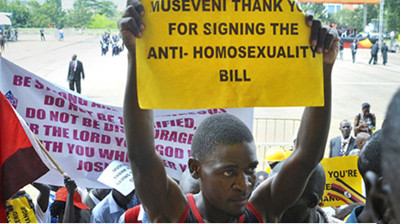世界銀行
Right cause, wrong battle
正確的起因,錯誤的斗爭
Why the World Bank's focus on gay rights is misguided
為何世界銀行對同性戀權利的關注是誤入歧途的
JIM KIM, the president of the World Bank, wants it to promote gay rights. He has declared the “fight to eliminate all institutionalised discrimination” to be an “urgent task”. He recently put on hold a $90m loan to Uganda's health sector after its government introduced one of Africa's most draconian anti-gay laws. He has ordered an overhaul of the bank's lending policies to make sure that no loan assists discrimination. At this week's Spring Meetings in Washington, DC, he is convening discussions with gay activists on how best to do so.
世界銀行總裁Jim Kim想要提高同性戀的權利。他曾宣稱“消除所有制度化歧視的斗爭”是一項“緊急的任務��?���!苯眨驹摿飨驗醺蛇_健康部門的一項九千萬美元的世行貸款由于烏干達政府引入一項反同性戀法而被Jim Kim擱置�����,該法律稱得上是非洲最苛刻的反同性戀法之一��。Jim Kim已經下令對世行所有的貸款政策進行檢查����,以確保沒有支持歧視的貸款出現���。在本周于華盛頓召開的春季會議上����,他召開了一場討論,與同性戀積極分子商討最行之有效的方法��。
As an early proponent of gay marriage, this newspaper shares Mr Kim's sentiments. Bigotry is abhorrent and laws that entrench it should be condemned. Uganda's new law, which allows a maximum sentence of life imprisonment for anyone convicted of homosexuality and requires citizens to report anyone suspected of being gay, is particularly awful. Nonetheless, Mr Kim's initiative is misguided. The World Bank is a technocratic development organisation, not a place for political advocacy. Setting up gay rights as a test of its lending decisions is likely to make the bank less effective at what Mr Kim himself has emphasised is its core job: tackling extreme poverty.
作為一個早期的同性戀婚姻支持方����,《經濟學人》與Kim先生感情一致。世界不允許偏見����,維系偏見的法律也應當受到譴責。烏干達的新法不僅允許對同性戀實行終身監禁這一最高刑罰,還要求市民對任何可能的同性戀進行舉報��,這是尤其可怕的��。然而�,Kim先生發起的行動還是被誤導了��。世行是一個技術主導的發展組織而不是用作政治倡議的����。設置同性戀權利作為其貸款政策的檢測關卡可能會使得世行在消除極端貧困問題的效率上大打折扣��,Kim先生曾經強調這是世行的核心任務�。

The bank's technocratic approach is a big part of its DNA. Its founding documents prohibit “political activity”, however unpleasant a regime might be. Only “economic considerations” should be relevant to lending decisions. That does not, by itself, preclude it from opposing nasty laws. You can draw a link from fighting bigotry to alleviating poverty. Unfair treatment of groups of people, whether on the basis of gender, race or sexuality, leads to their social exclusion, which in turn is likely to harm economic growth and make it harder to alleviate poverty. By this logic the bank has, rightly, long been pushing for the education of girls. The fight against other forms of discrimination can be justified on the same economic grounds.
世行的技術解決論在該組織的特色中扮演了一個重要的角色�。它的創建文獻就寫明禁止“政治活動”,無論哪個國家有多么不高興�。只有“經濟上的考量”應當與貸款決策有關���。這本身并不排斥它反對一些齷齪的法律����。從反抗偏見到減輕貧困�,人人都能看到之間的聯系。群體性的不公平待遇����,不管是基于性別����、種族還是性征,都會導致社會的排斥����,這反過來又可能損害經濟增長,使得減輕貧困的道路愈加艱難。正是由于這一邏輯關系����,世行長期以來正確地推動了女孩教育����。對其他形式歧視的抗爭也基于同樣的經濟原理而合乎情理��。
A rainbow of reasons
原因一籮筐
But even if it can be justified in principle, Mr Kim's focus on gay rights is likely to be counterproductive in practice, for three reasons. First, it seems capricious. Uganda is hardly the only country with anti-gay laws on the books; nor is it the only one to have recently toughened its anti-gay stance. Almost 80 of the bank's member countries, including most in Africa, have legislation that discriminates against gays. In many places the laws are ignored, but several places, notably Ethiopia and Nigeria, have recently introduced stiffer anti-gay statutes. Uganda's behaviour is odious. But it is not alone.
但是����,就算大體上合乎情理����,Kim先生對同性戀權利的關注還是有可能在實踐中事與愿違。這出于三個原因。第一����,問題反復無常��。烏干達不是唯一將反同性戀法合法化的國家,也不是近期唯一強調反同性戀立場的國家。包括非洲多數國家在內的近80個世行的成員國都有歧視同性戀的法律�。這些法律在很多地方被忽視�����,但是在有些地方尤其是埃塞俄比亞和尼日尼亞,最近都出臺了更嚴苛的反同性戀法令。烏干達的做法令人不齒�,但它不是唯一有如此行為的國家�。
Second, the stress on gay rights itself seems arbitrary. Of the many forms of bigotry the bank could battle, it is not clear that anti-gay laws are the most harmful to the poor. The bank lends to plenty of places that discriminate against women under Islamic law. It also lends to countries with laws that discriminate against minorities. The economic impact of these forms of bigotry is far bigger. But if Mr Kim tries to tackle all institutionalised discrimination by withholding lending, he will soon have no customers left.
第二��,強調同性戀權利本身看來就很武斷�����。在多種形式的世行可以選擇對抗的偏見中�����,并不清楚反同性戀法對窮人造成的傷害就是最大的���。世行為很多在伊斯蘭法律下歧視女性的地域提供貸款��,它也為存在歧視少數民族法律的國家貸款。這些形式的偏見造成的經濟危害更大��。然而Kim現實試圖通過扣貸款的方式來解決一切制度歧視����,他很快就會發現他的客戶都所剩無幾了。
Third, his approach is likely to backfire. In the short term, it weakens the campaign to lessen poverty. Uganda's loan, designed to support maternal-care clinics, was the equivalent of 20% of its health budget. And it still has a high child-mortality rate. Politically, the pressure from Mr Kim, though winning plaudits in Washington, is having perverse results, where it matters most. Uganda's government declares itself to be standing up against the arrogant imposition of “Western values”. The more the World Bank adds such conditions to its lending, the more African countries will be inclined to seek money elsewhere, not least from the no-questions-asked Chinese.
第三��,他的策略可能適得其反���。短期來說�,它將削弱消除貧困的行動。烏干達的貸款是用來援助當地產科診所的�,它相當于該國衛生預算的20%?,F在�,烏干達的兒童死亡率還是高居不下。從政治上來說�����,Kim先生面臨的壓力正在引發反常的結果�。盡管他在華盛頓會議這一舉足輕重的場合還是贏得了一片喝彩。烏干達政府聲明反對粗魯傲慢的“西方價值觀”的輸入�。世行對該國的貸款施加的條件越多��,有意從其他渠道尋求資金的非洲國家就會越多,它們尤其可能從不問問題的中國尋求幫助����。
The uncomfortable truth is that an economic institution like the bank has to pick its battles. There is a limit to how many conditions outsiders can attach to their aid. Its aim is to encourage economic development. Most of the evidence is that the bank is most effective when client countries see it as an economic partner, rather than a boss imposing a Western agenda.
像世界銀行這樣的經濟機構必須選擇好戰斗方向���,這一事實令人不快����。外界在援助同時附加的條件是有限度的��。世行的目標是推動經濟發展�。多數證據表明���,會員國將世行看作經濟伙伴而不是強加西方思想的老大才會讓世行更加有效率�。
Ironically, at one level, Mr Kim seems to realise that. He is sponsoring a big management reform designed to make the bank better at finding the most promising solutions from around the world to help countries develop faster. Launching a battle for gay rights may salve consciences, but will make it harder to achieve that goal.
很諷刺的是,從一種層面上�����,Kim先生似乎意識到了這一點:他正在發起一個大型的管理改革�����,用來使世行在尋找全球范圍內幫助國家更快速發展的最有希望的解決方案上做得更好�����。發起針對同性戀權利的斗爭可能會安撫人心,但會使得上述目標的實現變得更加艱難���。












